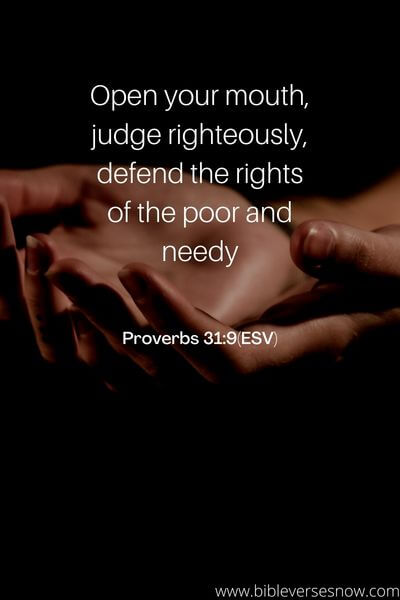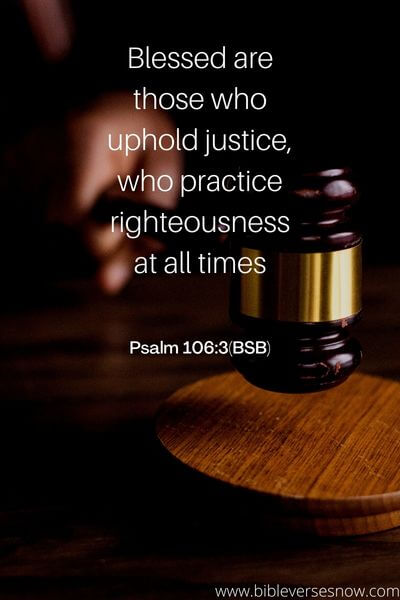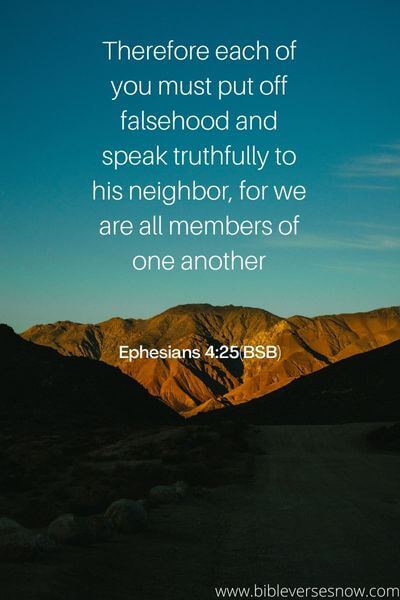The Bible stresses the significance of treating everyone fairly, not only older people. The Old Testament contains a specific law for this, while the New Testament contains a different law for that. Some individuals may be thinking, how can we use these scriptures’ “Bible verses on fairness” to treat someone in a good way. So let’s look at some biblically stated Bible scriptures about fairness.
28 Bible Verses on Fairness
The Bible discusses social justice, known as “fairness” in our modern world. Love your neighbour as yourself, according to Proverbs 1:8, and return evil for evil, harm for harm, and insult for insult, according to Romans 13:8.
The Bible has a strong emphasis on fairness and a wide variety of ideas about fairness, but in this article, we’ll concentrate on verses regarding fairness from the perspective of God and how He interacts with humanity.
Proverbs 31:9
Open your mouth, judge righteously, defend the rights of the poor and needy.-

This verse is frequently read as an exhortation to advocate for justice and to protect the rights of those who are weak or oppressed.
It implies that we should be prepared to speak up against injustice or inequality in order to defend what is true and fair.
The text also exhorts us to judge justly and impartially, striving to comprehend both sides of a situation before coming to a conclusion.
Proverbs 31:9 serves as a general reminder to speak up for the weak and work for justice and fairness in the world.
Justice is what must be considered in our world today, not an issue to be debated.
Psalm 106:3
Blessed are those who uphold justice, who practice righteousness at all times.-

This portion of the bible explains how the psalmist is wishing happiness and prosperity for those who persistently uphold justice and righteousness in this verse.
The psalmist wishes for them to be rewarded for their actions and praises individuals who regularly behave in accordance with moral and just standards.
A lot of religious and philosophical traditions place a high value on justice and righteousness.
It entails conducting oneself in a fair and just manner and treating people with respect and kindness.
The psalmist is urging people to live by moral and ethical standards and to make an effort to be just and virtuous in their activities in the setting of this psalm.
Hebrews 6:10
God is not unjust; he will not forget your work and the love you have shown him as you have helped his people and continue to help them.-

The book of Hebrews 6 verse 10 is addressing a gathering of believers in this chapter, assuring them that God will not forget the service and devotion they have rendered to his name.
The author makes it clear that these Christians have been assisting the saints, or other Christians, as a sign of their devotion to and love for God.
The writer is encouraging the believers to continue serving and showing love, and assuring them that God will not forget their efforts.
The writer is also implying that God is and that he will reward those who serve and show love in his name.
The author is urging the readers to remain steadfast and carry on serving and displaying love in the face of obstacles or problems.
Romans 2:11
For there is no partiality with God.-

In this place of the Scriptures, Paul makes the case that everyone, Jew and Gentile which are non-Jew, is sinful and in need of salvation through Jesus Christ throughout the entire text.
He emphasizes that God does not favour one group over another in Romans 2:11. Jews or any other particular group are not the subjects of his bias or favouritism.
He instead grants redemption to everyone who trusts in him.
This line is frequently interpreted as a reminder that everyone is worthy of God’s love and grace and that no one is outside of his reach.
It reminds believers that they were rescued by God’s grace and not because of any inherent righteousness or deserving quality in themselves.
It also reminds us to treat others with respect and with love regardless of their background or identity, because God shows no partiality towards us either.
1 Peter 3:8
Finally, all of you should be of one mind. Sympathize with each other. Love each other as brothers and sisters. Be tenderhearted, and keep a humble attitude.-

This verse is frequently seen as a challenge to Christians to develop particular virtues as a means of demonstrating their faith.
The specific virtues mentioned in this verse include a tender heart, which is a heart that is sensitive to the needs and feelings of others; a humble mind, which is a mind that is willing to put the needs and interests of others before one’s own; sympathy, which entails demonstrating compassion and understanding toward others; brotherly love, which is a selfless love that seeks the good of other.
Believers can reflect Christ’s love and compassion by practising these characteristics even in the face of mistreatment or misunderstanding by those around them.
They can then serve as a beacon for the rest of the world and a testament to the gospel’s transforming influence.
The Biblical Definition of Fairness
The biblical concept of fairness is closely related to the idea of justice. The principle of treating others fairly, justly, and equally is one that appears frequently in the Bible.
This implies that individuals should be treated with dignity and respect and that their needs and rights should also be taken into account.
Leviticus 19:15, which says, “You must do no injustice in judgment; you shall not be partial to the poor or defer to the big, but in righteousness shall you judge your friend,” is a significant verse in the Bible that addresses the concept of fairness.
According to this scripture, being fair is treating everyone equally and avoiding bias or preference for any certain group.
Other verses that discuss fairness include Deuteronomy 1:17, which says, “You shall not be partial in judgment; you shall hear the small and the great alike; you shall not be intimidated by anyone, for the judgment is God’s,” and Psalm 82:2-4, which states, “How long will you defend the unjust and show partiality to the wicked?
Defend the weak and the fatherless; uphold the cause of the poor and the oppressed. Rescue the weak and the needy; deliver them from the hand of the wicked.”
What does the Bible Say about Fairness?
The Bible teaches that God is fair and just and that he expects his people to be fair as well. In the Old Testament, the Hebrew word for “fair” is “Tzedek,” which means to be righteous or just.
The concept of fairness is emphasized throughout the Bible, and there are many passages that address the importance of treating others with fairness and justice.
One example of this is found in the Ten Commandments, where God says, “You shall not bear false witness against your neighbour” (Exodus 20:16).
This commandment is about being fair and honest in our dealings with others, and not bearing false witness or spreading lies about them.
In the New Testament, Jesus teaches that we should love our neighbours as ourselves and that we should treat others the way we would like to be treated (Matthew 22:39).
This principle is known as the “Golden Rule,” and it is a key teaching of Jesus on how we should relate to others.
In general, the Bible teaches that fairness and justice are important values that should guide our actions and relationships with others.
Bible Verses about Honesty and Fairness
Honesty and fairness are important virtues that are valued in many different cultures and religious traditions, including the Bible.
The Bible teaches that honesty and fairness are essential for building trust, maintaining relationships, and living a life of integrity. Let’s see what the bible says about honesty and fairness below;
2 Corinthians 8:21
We are careful to be honorable before the Lord, but we also want everyone else to see that we are honorable.-

In this Scriptures, The apostle Paul is writing to the Corinthian church about the collection he is setting up for the underprivileged Christians in Jerusalem in a longer chapter that includes this verse.
Paul is highlighting the significance of acting in a way that is both honourable to God and respectable to others in this verse.
We are taking care to act justly and morally, as implied by the phrase “we are taking pains to do what is right,” which Paul and his friends use.
Paul appears to be conscious of the fact that his activities are being observed and evaluated by others because he uses the term “not only in the eyes of the Lord but also in the sight of man.” and he seeks to ensure that his conduct is respectable and decent toward both God and others.
In conclusion, this verse is a reminder that our actions should be guided by a desire to do what is right and to be a good example to others.
2 Timothy 2:15
Make every effort to present yourself approved to God, an unashamed workman who accurately handles the word of truth.-

This verse serves as a reminder to be attentive and vigilant in our work as well as to make an effort to earn God’s blessing by faithfully and precisely handling the word of truth.
This verse is a part of a greater section in which Timothy, a young pastor, is being urged to labour hard in his role as a gospel minister by the apostle Paul.
Paul advises Timothy to handle the word of truth rightly in this passage and to endeavour to have God approve of his job.
Do your utmost to show yourself to God as one approved—this command emphasizes that Timothy should make an attempt to earn God’s favour via his deeds and efforts.
Timothy is advised to work hard and carefully so that he has no reason to feel embarrassed or ashamed by his work, as suggested by the expression “a worker who needs not to be ashamed.”
Timothy should take care to accurately teach and interpret the Bible rather than distorting its teachings to suit his own objectives or to deceive others, as suggested by the term “who correctly handles the word of truth.”
Colossians 3:9
Do not lie to one another, since you stripped off the old self with its evil practices.-

This portion of the bible discusses how Christians should live out their faith.
Because they have died with Christ and been resurrected to new life in him, believers are urged at the beginning of the verse to focus their hearts and minds on things above rather than on earthly things.
The verse then lists certain actions that are incompatible with this new life in Christ, such as lying, displaying anger, and other wicked actions.
The idea that Christians have been changed by their trust in Christ and should no longer live in the same manner as they did before is conveyed by the expression “put off the old self.”
The old self refers to, with its practices, the way of life that an individual led before coming to know Christ.
This includes the sin and disobedience to God they lived in before receiving salvation.
This text exhorts Christians to avoid acting in ways that are inconsistent with their new identity in Christ and to live in a way that is compatible with that identity.
This includes not lying to one another, as well as refraining from other negative attitudes and actions like resentment and animosity.
Ephesians 4:25
Therefore each of you must put off falsehood and speak truthfully to his neighbor, for we are all members of one another.-

The idea behind this verse is that Christians should be honest and truthful with each other, and not engage in deceit or dishonesty.
This is seen as important because Christians are part of a community of believers, and honesty and truthfulness are essential to building and maintaining relationships within that community.
In addition to encouraging honesty and truthfulness, this verse also highlights the idea that Christians are interconnected and are all part of the same community.
This means that they should treat each other with respect and care, and not engage in behaviour that would harm or undermine the well-being of the community as a whole.
Generally, this verse serves as a reminder to Christians, to be honest, and truthful with each other and to work towards building and maintaining strong relationships within the community of believers.
Unfairness refers to a situation where someone is treated unfairly or unjustly, often due to discrimination or bias.
In the Bible, unfairness is often associated with injustice and wrongdoing.
The Bible teaches that God is a just and righteous judge and that he expects his followers to also strive for fairness and justice in their own lives.
Isaiah 1:17
learn to do good; seek justice, correct oppression; bring justice to the fatherless, plead the widow’s cause.-
 In the book of Isaiah 1 verse 17, The people of Israel are urged by this text to actively work for justice and righteousness in their society.
In the book of Isaiah 1 verse 17, The people of Israel are urged by this text to actively work for justice and righteousness in their society.
It exhorts people to fight for the rights of marginalized groups like orphans and widows, who were frequently defenceless and impoverished in ancient society, and to work to rectify injustices.
By speaking out in favour of what is just and moral, the verse inspires others to act and have a good social impact.
This verse serves as a general reminder of the value of doing good deeds and working for justice and righteousness in the world.
It inspires us to fight for what we believe in and put forth the effort to improve the lives of others.
Romans 12:19
Dearly beloved, avenge not yourselves, but rather give place unto wrath: for it is written, Vengeance is mine; I will repay, saith the Lord.-
In Romans 12 verse 19, The apostle Paul is urging the Roman church in a lengthy chapter that this verse is part of to live in accordance with Jesus’ teachings.
When people wrong them or wound them, Paul is advising the Christians in this verse not to seek vengeance or reprisal.
Instead, he counsels them to place their faith in God and leave the issue of retaliation in His hands.
In the book of Deuteronomy, God speaks to the Israelites and promises that He will deal with anybody who hurts them.
This is when the phrase “vengeance is mine, I will recompense” first appears. This line in Romans serves as a reminder of God’s supremacy and ultimate control.
It encourages Christians to put their faith in God’s justice and to rely on Him for support and direction in trying times.
Proverbs 11:1
A false balance is an abomination to the LORD, but a just weight is his delight.-
This verse is contrasting two different things: a false balance and a just weight. A false balance refers to a dishonest or fraudulent way of measuring something, such as using a balance scale that is rigged to give an inaccurate result.
This kind of deceit is considered an abomination, or something that is deeply detestable or abhorrent, to God.
On the other hand, a just weight refers to a balance that is fair and accurate. This is something that God delights in or takes pleasure in.
This verse is emphasizing the importance of honesty and fairness in our dealings with others.
It reminds us that God values righteousness and justice and that we should strive to reflect these values in our own lives.
Jeremiah 22:3
This is what the LORD says: Be fair-minded and just. Do what is right! Help those who have been robbed; rescue them from their oppressors. Quit your evil deeds! Do not mistreat foreigners, orphans, and widows. Stop murdering the innocent.-
In this verse of the Scriptures, God is calling on the people of Israel in this verse to practice justice and righteousness and to defend the most defenceless members of their society.
The resident alien (a foreigner residing in the country), the fatherless (orphans), and the widow are specially mentioned in the verse as groups that need to be protected.
It also highlights how crucial it is to avoid killing innocent people or shedding their blood.
This verse serves as a reminder that God is a just and righteous judge, and that we should make an effort to live our lives in accordance with these principles.
It exhorts us to stand up for what is right, defend those who are weak, and protect the weak.
Bible Verses on the Wrong Foundation
In the Bible, a wrong foundation refers to a foundation that is not built on a solid and secure foundation.
In the context of faith and spirituality, a wrong foundation can refer to building one’s life and beliefs on something other than the teachings and truths of the Bible.
Ezekiel 18:20
The one who sins is the one who will die. The child will not share the guilt of the parent, nor will the parent share the guilt of the child. The righteousness of the righteous will be credited to them, and the wickedness of the wicked will be charged against them.-
God is speaking to the Israelites in a broader discourse that includes this verse, which is being delivered by the prophet Ezekiel.
God emphasizes in this verse that each person is accountable for their own deeds and will be held accountable for them.
According to the scripture, neither the parent nor the son shall be held accountable for the misdeeds of the other.
Instead, each individual will be assessed according to their own goodness or wickedness.
This verse is frequently read to suggest that no one is exempt from the repercussions of their own misbehaviour and that God holds each person responsible for their own acts.
It also implies that one cannot rationalize one’s behaviour or have excuses for their wrongdoing.
1 Corinthians 3:11
For no one is able to lay another foundation, besides the one being already laid, which is Jesus Christ.-
This verse talks more about the apostle Paul addressing the church in Corinth. In this passage, Paul is encouraging the believers in Corinth to focus on building their lives on a solid foundation, which he says is Jesus Christ.
He warns against trying to build on any other foundation, as it will not be able to support the weight of what is built on it.
This verse is often interpreted to mean that Jesus Christ is the only true foundation for a person’s life.
It suggests that building one’s life on Jesus Christ as the foundation will provide a strong and enduring foundation while trying to build on any other foundation will ultimately lead to failure.
The verse also implies that Jesus Christ is the only way to salvation and a fulfilling life.
Matthew 16:18
And I tell you, you are Peter, and on this rock I will build my church, and the gates of hell shall not prevail against it.-
This verse is part of a conversation between Jesus and his disciple Peter, in which Jesus is addressing Peter’s profession of faith in him as the Son of God.
In this verse, Jesus is making a promise to Peter that he will build his church, or community of believers, on the foundation of Peter’s faith.
Jesus also declares that the gates of hell, a metaphor for the powers of death and evil, will not be able to overcome or destroy his church.
This verse is often interpreted to mean that Jesus is the foundation of the church and that the church will endure and triumph over evil despite the challenges it may face.
It also suggests that the faith of individual believers, like Peter, is an important foundation for the church as a whole.
The verse is often seen as a promise of protection and perseverance for believers and the church.
Bible Verses about Being Unbiased
Unbiased means fair and not likely to support one particular person or group involved in something.
In the Bible, Jesus teaches about the importance of being unbiased and fair in one’s judgment. Just as in the Sermon on the Mount when Jesus instructed, “Do not judge, or you too will be judged.
For in the same way you judge others, you will be judged, and with the measure you use, it will be measured to you” (Matthew 7:1-2).
Let’s see other bible verses below talking about being unbiased;
Genesis 1:26
Then God said, “Let us make human beings in our image, to be like us. They will reign over the fish in the sea, the birds in the sky, the livestock, all the wild animals on the earth, and the small animals that scurry along the ground.-
In this verse, God discusses the creation of humans. The phrase “in our image, after our likeness”, alludes to the idea that humans were created to some degree to resemble God.
God grants humans dominion over all other animals on earth, the text continues. This indicates that it is up to us as humans to take care of and manage the earth’s resources.
Some people read this verse to grant humans a unique status among all other living things on earth, as well as the freedom to use and exploit the planet’s resources anyway they see fit.
See it as a call to stewardship, where humans are entrusted with caring for the environment and its resources.
Hebrews 10:26
For if we sin willingly after we are to receive the knowledge of the truth, no longer remains a sacrifice for sins.-
Hebrews 10:26, Discusses the consequences of deliberately and persistently rejecting Jesus Christ and his teachings.
In this verse, we are warned that if we continue to reject Jesus and his sacrifice for our sins, there will be no more opportunity for repentance and forgiveness.
We are urged to turn away from sin and embrace the salvation that Jesus offers through his death and resurrection.
It’s crucial to understand that this scripture does not imply that someone can forfeit their salvation after accepting it.
Instead, it serves as a warning to those who have not yet trusted in Jesus as their Savior and are still refusing to believe in him.
It is a call to reject sin and clings to Jesus’ promise of redemption.
1 Timothy 5:21
I solemnly command you in the presence of God and Christ Jesus and the highest angels to obey these instructions without taking sides or showing favoritism to anyone.-
The apostle Paul addressed a letter to Timothy, a young pastor in the early Christian church, that contains this verse.
Paul is issuing Timothy a stern order or charge in this verse. Timothy is being advised to handle church problems impartially and fairly, without exhibiting any partiality or favouritism for any one individual or group.
By stating that this accusation is offered “in the face of God and Christ Jesus and the elect angels,” Paul highlights its significance of it.
This implies that God and the angels would examine and judge Timothy’s deeds and decisions as a pastor and that he should take care to be faithful and submissive to God’s will in all ways.
Basically, this passage exhorts believers to treat people fairly and justly and to refrain from displaying prejudice or partiality toward any individual or organization.
Bible Verses on Fairness and Justice
Fairness is frequently used in reference to the capacity to make decisions without taking into account one’s sentiments or personal interests, whereas justice is typically used in connection to a standard of rightness.
The Bible teaches that fairness and justice are important values that God expects His people to uphold. God is described as being a God of justice and righteousness, and He expects His people to reflect these same qualities in their own lives.
Let’s see such similarities in the scriptures below;
Psalm 9:8
He rules the world in righteousness and judges the peoples with equity.-
This verse asserts that the Creator is all-powerful and sovereign since the psalmist says that God is seated on a throne above the earth.
It is implied that the inhabitants of the earth are small and insignificant in comparison to God by the comparison of them to grasshoppers.
God’s majesty and power are further highlighted by the concept of God spreading out the heavens like a canopy and tent.
This verse can be seen as a proclamation to trust in and rely on God’s protection and direction as well as a reminder of God’s greatness and sovereignty.
It also serves as a reminder of the value of humility by making us aware of how small and insignificant we are in the scheme of things.
2 Corinthians 8:13
Of course, I don’t mean your giving should make life easy for others and hard for yourselves. I only mean that there should be some equality.-
This verse discusses the gathering of monetary donations for the underprivileged in Jerusalem.
The Corinthian church is urged to donate to this collection by Paul, the author of 2 Corinthians, but he wants to be clear that he is not advocating that they shoulder an excessive burden.
Instead, he wants them to make a fair and appropriate contribution.
Paul is highlighting the value of fairness and cooperation among Christians in this context.
He is encouraging the Corinthian believers to support their fellow believers in Jerusalem, not out of a sense of obligation or burden, but rather out of a sense of fairness and love.
Acts 17:31
For He has set a day when He will judge the world with justice by the Man He has appointed. He has given proof of this to everyone by raising Him from the deadFor He has set a day when He will judge the world with justice by the Man He has appointed. He has given proof of this to everyone by raising Him from the dead.-
In this scripture, Apostle Paul is addressing the Athenians about the Christian religion.
He is trying to persuade the Athenians in this text that God is the last arbiter of all humanity and that Jesus Christ is the one through whom he will judge the world.
The resurrection of Jesus, a key Christian doctrine, is alluded to when it is said that God raised Jesus from the grave.
Jesus was crucified and buried, according to the New Testament, but on the third day after his death, he rose from the grave and appeared to his disciples and other people as a living creature.
Jesus’ resurrection is viewed as evidence of both his deity and God’s purpose for humanity.
In essence, Paul is claiming that by raising Jesus from the dead, God has demonstrated to everyone his purpose for the world.
He is urging the Athenians to take this evidence into account and to turn to God in confidence, trusting that he will one day judge the world fairly.
Psalm 1:5
Therefore the wicked will not stand in the judgment, Nor sinners in the assembly of the righteous.-
In accordance with this verse, neither the righteous nor the wicked will be able to stand in judgment nor be a part of the society of the righteous.
The wicked are those who do not obey and meditate on the law of the Lord. In other words, they won’t experience blessing and prosperity like the one who takes great pleasure in the Lord’s law.
It’s crucial to understand that this scripture does not claim that only the good and upright will be blessed and succeed.
Instead, it is stating that even though they are imperfect and may still battle with sin, individuals who desire to follow the Lord and reflect on his teachings will be blessed and succeed.
Bible Verses on Fairness and Equality
Fairness and equality are two values that are often seen as important for ensuring a just and harmonious society.
One example of fairness and equality emphasized in the Bible is in the commandment to “love your neighbour as yourself” which is in Leviticus 19:18.
This commandment is often seen as a call to treat others with compassion and fairness, and to consider the needs and well-being of others as equally important to our own.
Below are highlighted bible verses on fairness and equality;
Ecclesiastes 9:11
I have seen something else under the sun: The race is not to the swift or the battle to the strong, nor does food come to the wise or wealth to the brilliant or favor to the learned; but time and chance happen to them all.-
The writer asserts in this chapter that one’s aptitudes or personal traits aren’t always what determines success or failure in life.
Instead, it is frequently affected by arbitrary occurrences or uncontrollable conditions.
This Scriptures further tells us that nobody knows when their time will come and that death can strike suddenly, like a trap or snare.
This verse’s overarching theme is that we should make the most of the time we have because life is uncertain.
In Latin, this context means “Tempus fugit” meaning “Time flies” this is to tell you that time waits for no one, it’s best to utilize our time always.
Leviticus 19:15
You must not pervert justice; you must not show partiality to the poor or favoritism to the rich; you are to judge your neighbor fairly.-
This verse covers the rules and regulations pertaining to justice and righteousness. This text expressly forbids displaying prejudice or favouritism in legal proceedings.
It suggests treating everyone equally, irrespective of their social standing or financial means.
This text urges people to make fair and unbiased judgments when passing judgment and underlines the significance of sustaining justice and morality in society.
Justice is the principle or ideal of just dealing or the right action, in this case being unbiased is what we should be considering not giving heed to.
Leviticus 25:17
Show your fear of God by not taking advantage of each other. I am the LORD your God.-
These Scriptures declare at the outset that people should not mistreat or hurt one another.
This can be taken to suggest that people shouldn’t take any activities, whether purposefully or accidentally, that injure or cause pain to other people.
This covers both physically dangerous as well as emotionally or financially devastating behaviours.
This text also urges individuals to have fear of God.
This does not suggest that people should have a terrified or nervous relationship with God, but rather that they should respect and honour Him and make an effort to live in line with His precepts and commandments.
In this situation, fearing God could be seen as a way to acknowledge the significance of leading a moral life and obeying God’s rule.
This verse serves as a general reminder that people should treat one another fairly and with respect and that they should strive to live in a way that pleases God.
Psalm 7:11
God is a righteous judge and a God who feels indignation each day.-
David is showing his faith in God as a just judge in this verse. He thinks that since God is righteous and fair, He will punish sin.
Expresses his fury every day” implies that God is continually keeping an eye on His people and resolving injustice as it manifests itself.
It’s critical to remember that this verse should be interpreted in light of the entire psalm. David is pleading with God for justice and protection in Psalm 7 because he feels threatened by his foes.
He has faith that God will protect him and uphold justice. This verse is an affirmation of belief in God’s authority to judge and guard His people.
Bible Verses about Being Fair in Business
Being fair in business simply is the act of having some atom of consideration and being truthful when carrying out sales.
Below are stated bible verses that relate to this fact of “being fair in business”, the bible has outlined and given detailed explanations of them. Let’s have a glance through;
Proverbs 11:1-3
1 A false balance is an abomination to the LORD,
But a just weight is His delight.2 When pride comes, then comes dishonor,
But with the humble is wisdom.3 The integrity of the upright will guide them,
But the crookedness of the treacherous will destroy them.-
This bible verse imparts some moral guidance and wisdom. It expresses who God is, what he stands for, and what he kicks against.
“The Lord hates a false balance, but he delights in a just weight,” the Bible says. This is a warning against measuring or weighing items with dishonest or deceitful methods.
Using a false balance, such as a scale or other unreliable measuring tool, is an abomination because the Lord cherishes justice and honesty.
When pride appears, shame follows, but wisdom is found in the humble. In the Bible, pride is frequently viewed as a bad quality because it can breed arrogance and a lack of humility.
The author contends that whereas humility is accompanied by honour, pride frequently results in shame or disgrace.
They are led by upright integrity, but they are destroyed by treacherous’ crookedness. This verse emphasizes the significance of having integrity and acting honestly and righteously.
In contrast to people who are dishonest and treacherous (treacherous meaning “untrustworthy”), who will finally be destroyed by their crookedness, those who are upright and honest will be led by their integrity.
Bible Stories about Fairness
The Bible contains several tales that deal with justice and fairness. Here are a few illustrations:
Genesis 13’s account of Abraham and Lot describes how a land dispute arose between Lot’s herdsmen and Abraham’s.
Abraham proposed that Lot be allowed to select any piece of land he desired, and Abraham would take the remaining land in order to avoid future conflict.
Both men were able to coexist in harmony thanks to this generous and just deed.
Ruth’s story is one of devotion and justice, and it is found in the book of Ruth. Foreigner Ruth made the decision to go to a new country with her mother-in-law Naomi.
Ruth put a lot of effort into supporting herself and Naomi, and she was eventually rewarded with a husband and a position in the neighbourhood.
A man was robbed and left for dead on the side of the road in Luke 10’s parable of the Good Samaritan.
A group of people the Jews regarded as enemies, the Samaritans, stopped and attended to the man’s wounds while several other people walked by without aiding him.
This narrative highlights the value of treating everyone with kindness and justice, no matter their circumstances.
The Prodigal Son parable in Luke 15 describes a father who hosted a feast to honour the homecoming of his wayward son and welcomed him home with open arms.
This tale demonstrates the value of forgiving others and treating them fairly and compassionately despite their shortcomings.







